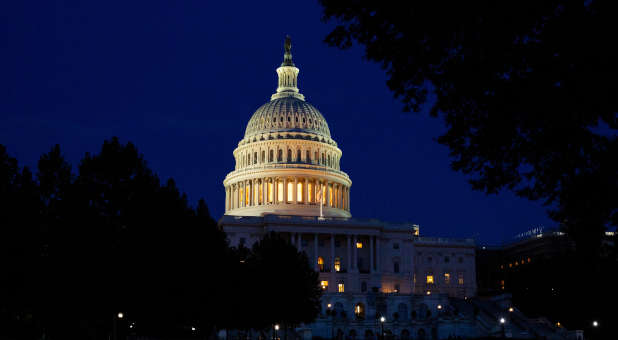How Our Democratic Congress Now Rejects the Book That Made America
The rejection of America’s Christian roots was on full display recently when, on the floor of the House of Representatives, Jerry Nadler (D-N.Y.), chairman of the House Judiciary Committee, sternly rebuked Greg Steube (R-Fla.) for daring to read from the Bible during a debate on transgender issues. “Mr. Steube,” he pointedly said, “What any religious tradition describes as God’s will is no concern of this Congress.”
Nadler’s attitude is typical of a cultural shift in America wherein the Bible, once revered, is now dismissed and demeaned. It is a sharp departure from America’s founding generation where the Bible was read and revered by all classes whether rich or poor, slave or free, aristocrat or peasant.
The Most Read Book in Early America
The Bible was, in fact, the most popular book in America at the time of its founding. America’s founding generation found in the pages of the Bible its moral compass, its guide for ethics and its Christian worldview.
A 1982 article in Newsweek magazine, entitled “How the Bible Made America,” made this point in vivid fashion. The authors wrote:
“For centuries, the Bible has exerted an unrivaled influence on American culture, politics, and social life. Now historians are discovering that the Bible, perhaps even more than the Constitution, is our founding document: the source of the powerful myth of the United States as a special, sacred nation, a people called by God to establish a model of society, a beacon to the world” (Hyatt, 1726: The Year that Defined America).
Andrew Jackson, America’s seventh president, understood this. He once gestured toward a Bible and declared, “That book, sir, is the rock on which our Republic rests.”
The Bible and America’s Origins
The first immigrants to these shores held the Bible in high esteem. The Pilgrims, and the Puritans who followed them, would be the first to admit that they often fell short of the teachings of Jesus and the New Testament, but at least they acknowledged that this was the standard toward which all should strive.
In the Great Awakening (1726-70), the American populace was reawakened to the Bible as the ultimate guide for faith, morals and life. Awakening preachers, such as Jonathan Edwards, George Whitefield and Richard Allen used the Bible to call the masses to absolute faith in Jesus Christ and a lifestyle patterned on His teachings.
It is, therefore, no surprise that when the First Continental Congress met on Sept. 5, 1774, they opened with an extended time of Bible reading and prayer. Rev. Jacob Dusche, who became their chaplain, began by reading the entire 35th Psalm to the assembled delegates, which included George Washington, John Adams, Samuel Adams, Patrick Henry, Richard Henry Lee and others.
As he read, a tangible sense of God’s presence seemed to fill the room. John Adams wrote to his wife, Abigail, of the impact of the Bible reading. He said:
“It was enough to melt a heart of stone. I never saw a greater effect upon an audience. It seems as if heaven had ordained that Psalm to be read that day. I saw tears gush into the eyes of the old, grave pacific Quakers of Philadelphia. I must beg you to read that Psalm” (Hyatt, 1726: The Year that Defined America).
The Bible Provided the Moral Basis for the Abolition of Slavery
At a time when slavery was accepted and practiced in Africa, Asia, the Middle East and throughout the world, it was the Bible that provided the moral arguments that brought slavery to an end in America.
For example, one of America’s most prominent founding fathers, Benjamin Rush, exhorted the pastors and ministers of America to take a bold stand against slavery, saying, “Slavery is a Hydra sin that includes in it every violation of the precepts of the Law and the Gospels” (Hyatt, 1726: The Year that Defined America).
George Washington was an avid reader of the Bible and considered it his ultimate guide for life. It was arguments from the Bible that turned him against slavery and caused him to set up a compassionate program to completely disentangle Mt. Vernon from the institution. It was the Bible that caused him to say concerning the abolition of slavery:
“Not only do I pray for it on the score of human dignity, but I can clearly see that nothing by the rooting out of slavery can perpetuate the existence of our nation by consolidating it in a common bond of principle” (Hyatt, 1726: The Year that Defined America).
Washington’s love for the Bible was affirmed by his nephew, Robert Lewis, who served as his secretary and lived with him while he was president. Lewis said that he had accidentally witnessed Washington’s private devotions in his library both morning and evening and that on those occasions he had seen him in a kneeling posture with a Bible open before him, and he believed such to have been his daily practice.
It was, therefore, no mere formality when Washington insisted on taking the first presidential oath of office with his hand on a Bible. It was a declaration on his part that the Bible would be the ultimate source of wisdom and guidance for his administration. It is reported that he once said, “It is impossible to rightly govern the world without God and the Bible.”
Founders Respect for the Bible
The founders respect for the Bible was verified in a 10-year project to discover where they got their ideas for America’s founding documents. Although they quoted ancient writers of Greece and Rome and contemporary writers of the Enlightenment, the study found that, by far, the single most cited authority in their writings was the Bible. {eoa}
For the rest of this original article, visit biblicalawakeningblogspot.com.
Read articles like this one and other Spirit-led content in our new platform, CHARISMA PLUS.














































